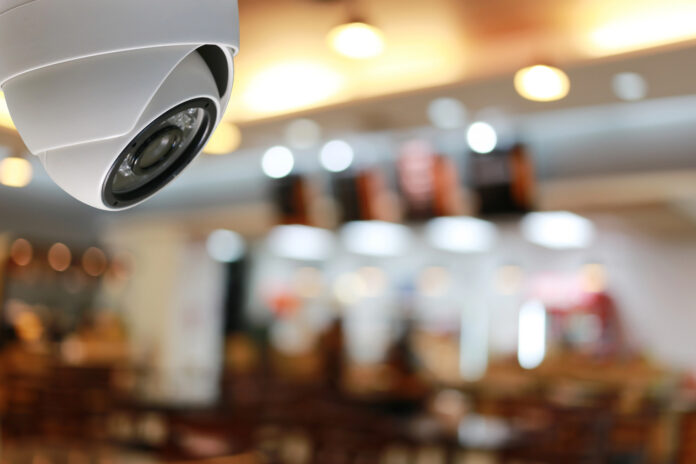The recent political & racist graffiti attack on Matt Moran’s Woollahra restaurant showed security cameras for cafes & restaurants are very much required …
In today’s fast-paced world, cafes and restaurants are more than just places to eat and drink — they’re hubs of social interaction, business meetings, and personal leisure. As such, they face unique security challenges, from theft and vandalism to employee misconduct and customer disputes. The question many restaurant and cafe owners face is whether investing in security cameras is necessary or just an added expense. This article will explore the reasons behind installing security cameras in these establishments, their benefits, potential downsides, and how they can contribute to a safer, more efficient operation.
The Case for Security Cameras
Preventing Theft and Vandalism
One of the primary reasons cafes and restaurants consider installing security cameras is to deter theft and vandalism. The presence of visible cameras can act as a deterrent to both external threats, like burglary or vandalism, and internal risks, such as employee theft.
Restaurants handle cash, inventory, and expensive equipment, making them attractive targets for thieves. Security cameras placed at entry points, near cash registers, and in storage areas can help protect these assets. Additionally, if an incident does occur, recorded footage can provide crucial evidence to law enforcement.
Enhancing Employee and Customer Safety
Safety is a top priority for any business, and restaurants are no exception. Security cameras can help create a secure environment for both staff and patrons. They allow management to monitor areas like parking lots, entrances, and dining areas, reducing the likelihood of incidents like harassment, altercations, or unauthorised access.
In the unfortunate event of an incident, video footage can help clarify the situation and protect both the business and its patrons from false claims.
Monitoring Operations and Ensuring Compliance
Security cameras can also serve a broader operational purpose. By monitoring activities in the kitchen, storage rooms, and dining areas, managers can ensure that employees follow proper protocols, including hygiene standards and safety regulations. This oversight can help reduce accidents, improve customer service, and maintain a consistent quality of food preparation.
Resolving Customer Disputes
Customer complaints are inevitable in the restaurant business. Disputes over billing, service quality, or incidents that occur on the premises can escalate quickly. Security cameras provide an impartial account of events, helping to resolve such issues fairly and effectively. For example, if a customer claims they were overcharged, footage from the point-of-sale area can be reviewed to verify the transaction.
Insurance Benefits
Many insurance providers offer discounts to businesses that implement security measures, including surveillance systems. Cameras can reduce liability in cases of injury claims or property damage, providing evidence to support or refute claims. This can result in lower premiums and fewer payouts, making them a cost-effective investment in the long run.
Potential Drawbacks of Security Cameras
While the benefits of security cameras are numerous, it’s important to consider the potential downsides to ensure a balanced perspective.
Privacy Concerns
Installing cameras in a business setting can raise concerns about privacy, particularly for employees. Staff members may feel uncomfortable or distrustful if they believe they are constantly being monitored. It’s crucial to strike a balance between surveillance and respect for privacy, ensuring cameras are placed in appropriate areas and that their purpose is clearly communicated.
Initial Costs
The installation and maintenance of a security camera system can represent a significant expense, especially for smaller establishments. High-quality cameras, storage devices, and monitoring software can cost thousands of dollars. However, this initial investment often pays off through the benefits they provide in deterring crime and resolving disputes.
Ongoing Maintenance
Like any technology, security cameras require regular maintenance to function effectively. Cameras may need updates, repairs, or replacements over time, and footage must be stored securely. Neglecting these responsibilities can lead to unreliable systems or even legal issues if recorded footage is unavailable when needed.
False Sense of Security
While cameras are a valuable tool, they are not a foolproof solution. Relying solely on surveillance systems without addressing other security measures, like proper lighting, employee training, and secure locks, can lead to vulnerabilities.
Best Practices for Implementing Security Cameras
For Sydney cafes and restaurants that choose to install security cameras, following best practices can maximise their effectiveness and minimize potential downsides:
Strategic Placement
Cameras should be placed in areas that are critical to security and operations. Key locations include entrances, exits, cash registers, storage areas, kitchens, and parking lots. However, avoid placing cameras in private areas like restrooms or changing rooms to maintain privacy and comply with legal requirements.
Invest in Quality Equipment
High-resolution cameras with night vision, wide-angle lenses, and remote access capabilities provide clear footage and greater coverage. Pairing cameras with motion detectors and alarms can further enhance security.
Communicate Policies
Clearly inform employees and customers about the presence of cameras and their purpose. This transparency fosters trust and ensures compliance with local privacy laws. Displaying signage about surveillance can also serve as a deterrent.
Regular Maintenance
Ensure cameras are functioning properly through routine checks and updates. Store footage securely, with clear retention policies for how long it will be kept and who has access.
Integrate with Other Security Measures
Combine cameras with other security measures, such as alarm systems, locks, and staff training, to create a comprehensive safety strategy.
Real-World Examples
The benefits of security cameras in cafes and restaurants are evident from numerous real-world examples:
Theft Prevention: A popular coffee shop in New York City reported a significant reduction in employee theft after installing cameras in storage areas and at the register. The footage also helped management identify process inefficiencies.
Customer Safety: A small restaurant in Los Angeles used parking lot cameras to address a customer’s claim of vandalism to their car. The footage helped identify the culprit and strengthened the restaurant’s reputation for prioritizing safety.
Operational Insights: A busy cafe in Chicago used footage from kitchen cameras to identify gaps in workflow and improve order preparation times, resulting in better customer satisfaction.
Does Your Cafe Need Security Cameras?
Whether a cafe or restaurant needs security cameras depends on several factors, including location, size, and specific security concerns. However, for most establishments, the advantages—such as deterring crime, improving safety, resolving disputes, and enhancing operations—far outweigh the drawbacks.
Security cameras are not just about catching wrongdoing; they are about creating a safer, more efficient environment for everyone. By thoughtfully implementing a surveillance system, cafe and restaurant owners can protect their businesses, foster trust with employees and customers, and ensure peace of mind. While they may not be a legal requirement, security cameras are quickly becoming an essential tool in the competitive and complex world of hospitality.



